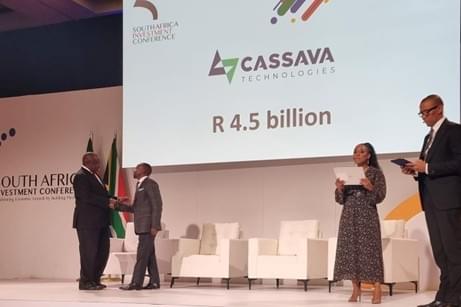Published by Reynolds Mark
Indeed, a wider change in global tech power is being signalled by the rise of AI in Africa. North America, Europe, and even parts of Asia have long dominated technological advancement.
However, this is beginning to change as AI usage rises in Africa, and the continent may soon play a significant part in the global tech scene.
Nigeria, South Africa, Kenya, and Egypt are among the countries in Africa that are rapidly emerging as centres of innovation and technology. Cities like Lagos, Cape Town, and Nairobi are becoming significant centres of technology, with AI businesses expanding
quickly in these areas.

Organisations like Andela, MEST Africa, and CcHub are contributing significantly to the training of the upcoming generation of African AI practitioners and software engineers. Growing venture capital investment and growing government interest in promoting digital economies support these clusters. African AI companies are making rapid progress and regularly creating solutions tailored to the continent's unique social and economic conditions. For example, AI-powered systems are being used to analyse soil, identify crop illnesses, and optimise crop planting schedules. Identifying crop diseases and assessing soil conditions, two essential skills in nations where agriculture continues to be the main source of income. AI in healthcare includes facilitating early illness identification
for conditions like cancer, TB, and malaria, automating medical record administration, and enabling remote diagnostics. Millions of people who were previously shut out of the formal banking industry now have more access to financial services thanks to the application of AI in finance to risk assessment, fraud detection, and mobile banking.
At the same time, there is a demographic dividend in digital technology across the continent. With more than 70% of its people under 30, Africa has the youngest population in the world. This young group is eager to participate in the global digital economy, is extremely adaptive, and was born into the digital age. A new generation of self-taught and institutionally trained AI developers, data scientists, and machine learning engineers is emerging as a result of growing access to mobile devices, online learning, and open-source tools.

Furthermore, multinational tech giants are paying attention. Businesses that are making significant investments in Africa include Google, Microsoft, Amazon Web Services, IBM, and Meta. In 2018, Google opened the continent's first AI research facility in Accra, Ghana. In Kenya and Nigeria, Microsoft maintains its Africa Development Centre, where African developers create products for the worldwide market. The awareness that Africa has undeveloped talent and distinctive innovation potential that can impact the future of global AI development is reflected in these actions, which go beyond simple market expansion.
Additionally, governments are starting to take a more active role. To direct research, control ethical issues, and guarantee that AI supports inclusive, sustainable
development goals, nations such as South Africa, Kenya, and Rwanda are developing national AI policies. In order to tackle problems like data governance, digital infrastructure, and cross-border AI research, pan-African partnerships are also starting to take shape.
Africa's AI momentum is a tale of innovation, leadership, and potential impact rather than merely catching up. The region may contribute to rebalancing global tech power, provide fresh insights into responsible AI use, and highlight technologies that address humanity's most pressing needs as it continues to expand its AI capabilities. The emergence of AI in Africa is not only a chance for the region but also a crucial development for the advancement of technology worldwide.

Introducing BOTLHALE—AI Solutions. At Botlhale AI, we are driven by the belief that language should never hinder access to digital services. While speech-based human-computer interaction systems and natural language processing tools have gained global popularity, they predominantly cater to English and other major languages. Their goal is to eliminate this disparity by extending these technologies to African languages. We aim to empower speakers of African languages to enjoy the conveniences and innovations these systems bring to their daily lives.
Their mission is to recognise the exclusion of African languages as a significant obstacle to meaningful digital engagement and access to opportunities. We are dedicated to addressing this challenge head-on. What they are doing is really marking a space for Africa in the global tech world. As we have just seen, their strongest goal is to build a future where people across Africa can use their own languages to access digital services to learn and grow and to connect with the world.

CASSAVA TECHNOLOGIES is a global technology leader of African heritage, providing a vertically integrated ecosystem of digital services and infrastructure enabling digital transformation. Cassava has a presence across Africa, the Middle East. Through its business units, namely, Cassava AI, Liquid Intelligent Technologies, Liquid C2, and Africa Data Centres, the company provides its customers’ products and services in 94 countries. These solutions drive the company’s ambition to establish itself as a leading global
technology company of African heritage.
The Cassava AI Factory will ensure businesses and researchers have access to the AI
computing power required to scale, boost productivity and power innovation. By
using this secure, high-performance AI Factory, African businesses and governments can develop local solutions to local challenges, enabling Africans to build, train, scale and deploy AI in a secure environment compliant with
global and local regulations.
Building digital infrastructure for the AI economy is a priority if Africa is to take full advantage of the fourth industrial revolution. Our AI Factory provides the infrastructure for this innovation to scale, empowering African businesses, startups and researchers with access to cutting-edge AI infrastructure to turn their bold ideas into real-world
breakthroughs, and now, they don’t have to look beyond Africa to get it.

Collaborating with NVIDIA gives us the advanced computing capabilities needed to drive Africa’s AI innovation while strengthening the continent’s digital independence.” Cassava’s AI Factory marks the next step in the group’s long-standing leadership in providing world-class digital solutions, reinforcing its broader commitment to responsible AI adoption, innovation and productivity growth in Africa.
With the youngest population of any continent, Africa is home to a fast-expanding youth population that is ready to adopt new technologies. Africa has a huge chance to lead the world in AI skills thanks to this demographic transition. A new generation of technologists is being produced by the continent's nations, investing more in education and AI-focused initiatives. As Africa advances in AI development, we may witness a more decentralised distribution of power in the IT industry, which has historically been concentrated around a small number of firms in the West and Asia. Because AI is becoming more and more prevalent in industries like business, healthcare, agriculture, and governance, nations like South Africa and Nigeria may be able to influence AI policy and legislation internationally.
The AI boom in Africa is not without its difficulties. Although there are still issues to be resolved, such as infrastructure, data privacy, and educational access, the advancements in recent years indicate that Africa may soon become a major player in the global AI scene. Africa has a unique opportunity as it can lead the world in AI development while simultaneously tackling regional issues.
More than just scientific advancement, Africa's growing adoption of AI signals a fundamental shift in the world's technological dominance. The continent is not
only on the edge of the digital revolution, but it is actively influencing its future thanks to a brimming pool of young talent, emerging innovation ecosystems, and AI solutions that are firmly anchored in local reality.
Africa's impact on global technology will only increase as long as it keeps funding AI
infrastructure, legislation, and education. Africa's place in the global economy is being redefined by this shift, which also puts conventional tech hubs to the test and demonstrates that innovation transcends national borders.
The emergence of AI in Africa represents a worldwide turning point, not merely a local success story.
By
Walter Okoise
Contributing writer
Editor in Chief
Reynolds Mark
Project lead
Oliwia Klimczak
